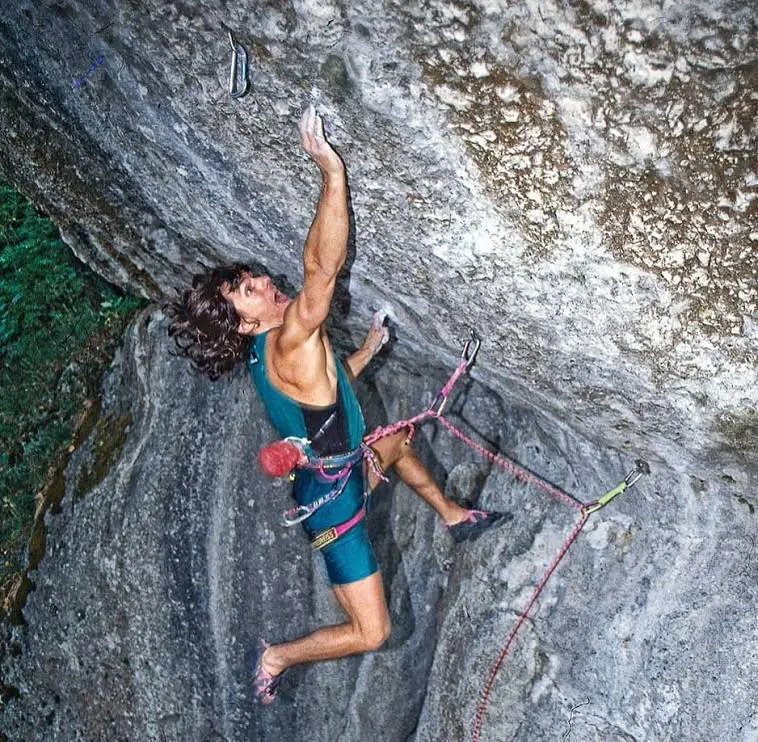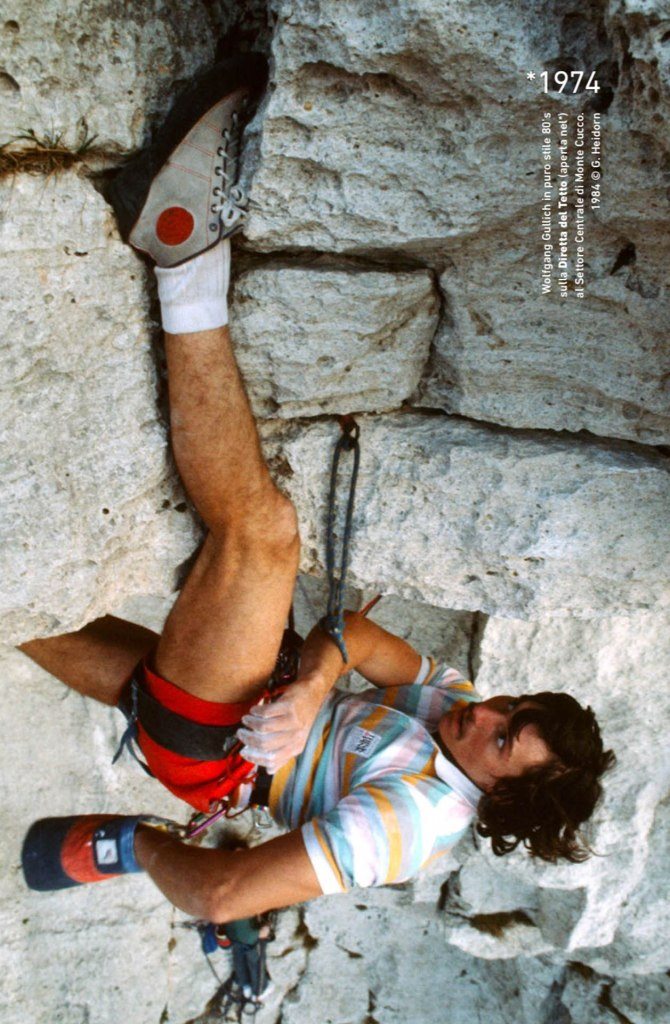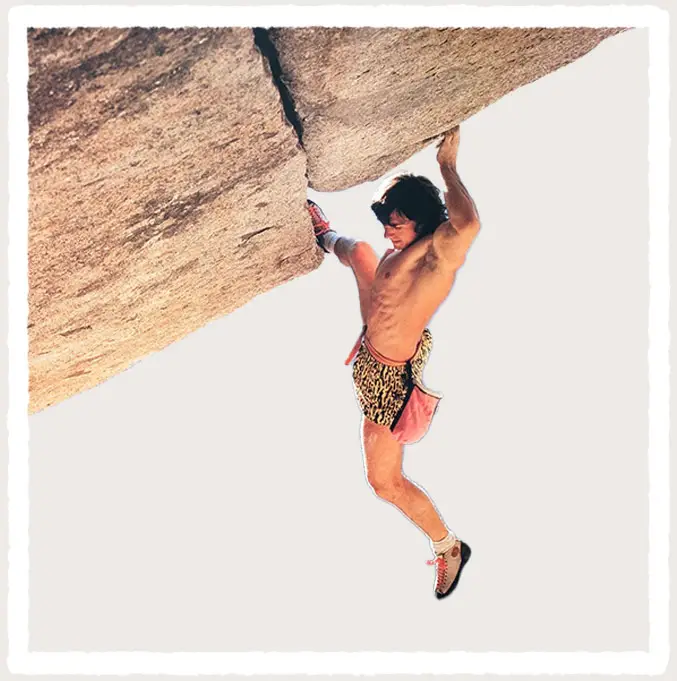
Ascent Log
| Climb | Type | Suggested Grade | Date of Ascent | Notes |
|---|---|---|---|---|
| Action Directe | Sport Route | 9a/5.14d | 14th Sep 1991 | Wolfgang made the FA of the first 9a in the world. He spent 11 days on the route and did specific finger strength training with the Campus Board (which he invented) |
| Wallstreet | Sport Route | 8c/5.14b | 1987 | Facebook Image |
| Punks in the Gym | Sport Route | 8b+/5.14a | 1985 | FA. Facebook Image |
| Kanal im Rücken | Sport Route | 8b/5.13d | 1984 | FA |
| Dead Line | Sport Route | 8b/5.13d | 1986 | FA |
| Kamasutra 218 | Sport Route | 8b/5.13d | 1986 | FA |
| Ghettoblaster | Sport Route | 8b/5.13d | 1986 | FA |
| La Rose et le Vampire | Sport Route | 8b/5.13d | 80s | Facebook Image |
| Grand Illusion | Trad | 8a+ E8 | 1982 | Second ascent after Tony Yaniro |
| Edge Lane | Trad | E5 | 80s | Facebook Image |
| Separate Reality | Free Solo | E5 | 1986 | Facebook Image |
| Midnight Lightning | Boulder | V8/7B | 80s/90s | Instagram Post |

Climbing Career
Wolfgang Güllich was born on October 24, 1960, and left us too soon on August 31, 1992, but during his short time on this planet, he managed to redefine what was possible in the world of climbing. His accomplishments and contributions to the sport are nothing short of legendary, and his name will forever be etched in the annals of rock climbing history.
With a string of record-breaking ascents, he set the bar for sport climbing at a dizzying height, continuing to push the limits even as he broke them. He cemented his place in history with a series of groundbreaking climbs, including Punks in the Gym, the first-ever 8b+ (5.14a), Wallstreet, the first-ever 8c (5.14b), and the awe-inspiring Action Directe, the first-ever 9a (5.14d) and the hardest sport route at the time.
Wolfgang also did some daring free solo ascents.

These feats earned him the title of “world’s strongest sport climber,” a crown he wore with pride until his untimely death in a car accident at the age of 31. Even after his passing, his legacy lived on, inspiring a new generation of climbers to reach new heights and push the boundaries of what is possible.
Learning the Ropes
Wolfgang Güllich’s father was the one who introduced him to aid climbing when he was just 13 years old. By the time he was 15, he was already climbing almost every weekend in the Südpfalz region with his younger brother Fritz, who unfortunately died in a climbing accident in 1978.
It was after meeting Reinhard Karl, a leading figure in German mountaineering, that Güllich decided to fully dedicate himself to climbing. At that time, free climbing was not yet a widely practiced sport, but Güllich was determined to make it his focus.
Outdoor Climbing
Wolfgang Güllich was a climbing prodigy, conquering Germany’s Frankenjura limestone cliffs and becoming the region’s best by the age of 16. Internationally recognized after nailing Tony Yaniro’s historic Grand Illusion route 8a/5.13b, Wolfgang ventured across China, the USSR, and the Sinai Desert, proving his mettle by mastering the world’s most demanding routes.
Bromance bloomed with Kurt Albert in the US, who introduced Wolfgang to the “rotpunkt” climbing philosophy, a now crucial performance measure. Together, these daredevils championed the sport climbing movement from their shared Frankenjura base and were rewarded with the “Silberne Lorbeerblatt,” Germany’s top sports honor.

Wolfgang was an overachiever, setting world records in the 8b, 8b+, and 8c grades and inventing the globally recognized Campus Board. Despite his fame for mastering the formidable Action Directe climb, his legacy extended far beyond, tackling unchartered territories and leaving an indelible mark on global climbing.
His high-altitude expeditions in Pakistan and Patagonia sparked his creation of Action Directe, achieved just five days post-wedding. Despite the allure of competitions, Wolfgang was a purist, cherishing the thrill of real routes and the creation of new ones. Wolfgang’s intense and scientific approach to training, coupled with his advocacy for bouldering, solidified his reputation as a true luminary of the sport. His philosophy was clear: “If climbing is an art, then creativity is its main component.”
The Birth of the Campus Board
Wolfgang Güllich’s power was second to none, but he recognized that in order to achieve even greater heights, he needed to up his training game. And that’s exactly what he did. He understood that to truly excel at climbing, he needed to focus on the unique demands of each individual route. This led him to develop the Campus Board, a training tool that revolutionized the climbing world.
Güllich’s creation of the Campus Board was a game-changer. In 1988, he hung the first Campus Board in the Univesity gym, called the Campus Centre, It was specifically designed to meet the grueling demands of Action Directe, a route that required ferocious power. The Campus Board was a series of rows of tiny crimps that allowed climbers to blast up and dyno down, perfectly mimicking the requirements of these challenging climbs.

Today, the Campus Board is a ubiquitous feature in climbing gyms across the globe. And it’s easy to see why. This tool has proven to be fundamental to the success of many climbers, helping them to improve their finger strength and overall power. It has truly changed the game, allowing climbers to train more efficiently and effectively than ever before.
Wolfgang Güllich’s Campus Board has been a major contribution to the climbing world, but it’s also a testament to his ingenuity and determination. His understanding that the brain is the body’s most important muscle led him to create a tool that has helped countless climbers to reach new heights. And for that, he will always be remembered as a true pioneer in the sport of climbing.
Notable Ascents
Action Directe
In September 1991, Wolfgang made history by conquering one of the most famous sport climbs in the world – Action Directe in the heart of Germany’s Frankenjura. It was a climb that set new standards in sport climbing and remains an alluring dream for many and an irresistible challenge for the best of the best, even after over 30 years.

The Action Directe is to sport climbing what The Nose on El Capitan is to Yosemite. But, how did this route come to be? Wolfgang Güllich was already a seasoned climber, having dedicated his life to climbing and exploring the vertical impossible.
After months of intense training, Güllich found himself without a project to channel his immense strength into. That’s when his close friend Milan Sykora came to the rescue and pointed him to his own project hidden deep in the forest of Frankenjura. It was a stunning prow at the lone Waldkopf crag. Sykora had bolted the line coming in from the right, climbed the individual moves through the upper section, and believed the lower section to be feasible but too difficult for himself. He offered the project to Güllich, who promptly bolted the direct start, hence the name.
After 11 days of working the route, Güllich flowed up the sequence to claim the route’s first redpoint ascent. Action Directe was the start of a new degree of difficulty in the Frankenjura, which, as is almost always the case, took time to comprehend.

Güllich himself suggested a straight grade XI, the first of its kind on the UIAA scale adopted in Germany. Over time, the route settled down as the world’s benchmark 9a. He was 30 years old and just newly married when he executed the moves perfectly in just 70 seconds. His success on Action Directe in 1991 was the culmination of decades of hard climbing all over the world.
Action Directe, along with his free solo of Separate Reality are arguably Wolfgang’s top climbing achievements.
Death and Legacy
On August 31st, 1992, Wolfgang Güllich passed away in a car accident in Germany. He was only 31 years old. His death was a devastating loss for the climbing community, as he was widely regarded as one of the greatest climbers of his time. He had achieved so much in his short life, leaving behind a legacy that continues to be celebrated today.
Güllich’s contribution to the sport of climbing cannot be overstated. He was one of the pioneers of modern sport climbing, which involves climbing challenging routes with bolts drilled into the rock for protection. He set new standards for difficulty, pushing the limits of what was previously thought possible.

Güllich’s legacy has continued to grow in the years since his death. He has inspired countless climbers to push themselves to their limits, and his influence can be seen in the way climbing has evolved over the years. Many climbers today continue to use his techniques and training methods, and his climbs remain some of the most sought-after and revered routes in the world.
But perhaps Güllich’s greatest legacy is the way he inspired others to pursue their own dreams and passions. He was proof that with hard work, dedication, and a never-give-up attitude, anything is possible. His spirit lives on in the climbers he inspired and the climbs he conquered, and he will always be remembered as one of the greatest climbers of all time.

Video Library




Great respect to Great Legends in Yosemite National Park!